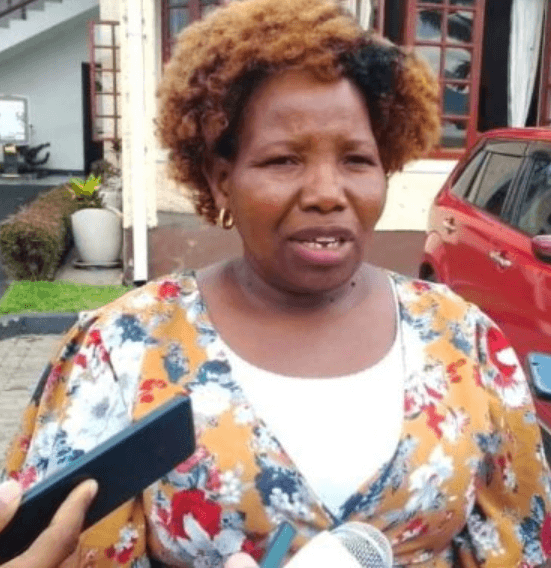
The Safe Motherhood coordinator for Blantyre District Health Office, Ellida Bvutula (photo above) is concerned about the rising number of teenage pregnancies and complications of unsafe abortions in Blantyre. “The possible solutions for us as health care providers are mostly health education for the community, making them aware so that they do not fall pregnant. We feel that community involvement is key for us to intervene in these problems before they propagate to become complications that may lead to maternal deaths, “she said.
Speaking at the meeting, the project officer of the Centre for Human Rights and Rehabilitation, Dennis Mwafulirwa, asked the government to consider reviewing the sexual reproductive health policies and laws, which, among others, will allow access to safe abortion. He said they are supporting the case of a minor who is seeking access to safe abortion after sexual assault.
Nyale Institute Executive Director Godfrey Kangaude said they were also supporting the case because once the courts determine the case, it will have an impact on social discourse and policy.
“We also hope that the case ruling will transform hospital practices towards survivors of sexual violence seeking termination of pregnancy, especially child survivors,” he said.
Data from Blantyre District Health Office shows that the majority of those seeking post-abortion care in the district are young girls. Of the 2,003 reported cases treated with post-abortion care for unsafe abortions in the last quarter of 2023, as many as 1,003 were under the age of 20, while the rest were only slightly over 20 years of age.
Blantyre-based youth activist Rebecca Majamanda said the figures highlight the vulnerability of adolescent girls and young women to the risks associated with unsafe abortion practices, including severe health complications and death. “The death of over 12,000 women and girls in Malawi due to pregnancy-related causes, including unsafe abortions, is a silent crisis because the government keeps mum on it,” said Brian Ligomeka, head of the Centre for Solutions Journalism.
“The fact that over half of the individuals seeking abortion services are under the age of 20 is deeply troubling,” said Majamanda. “It underscores the urgent need for targeted interventions to address the root causes driving young girls to resort to unsafe methods of terminating pregnancies.” She said peer pressure is one factor driving unplanned teenage pregnancies among most girls.
She also decried the increase in sexual assaults, including incest, defilement and rape: “There are many stories of male relatives who have forcibly had sex with girl children they were staying with. When the girls fall pregnant as a result, they are forced to have abortions in an unsafe way,” she said.
Gertrude Kapyepye, Youth Programme Coordinator for the Sexual and Reproductive Health and Rights Alliance, said they organised the dialogue meeting with students at the Malawi University of Business and Science (MUBAS) to unpack the magnitude of unsafe abortion in Malawi. Speaking at a dialogue session on the Termination of Pregnancy Bill there, she pointed out that restrictive laws were fuelling unsafe abortion cases in Malawi.
The Coalition for the Prevention of Unsafe Abortion (COPUA) Legal Committee chairperson Mateyu Sisya said that the dialogue sessions created an opportunity to enlighten students and community members about what is in the Termination of Pregnancy Bill. “The ultimate aim of the bill is that women and girls should not die from unsafe abortions. It is a bill that aims to reduce maternal deaths from unsafe abortions,” he said.
The government, through the Law Commission, reviewed abortion laws and drafted the proposed Termination of Pregnancy Bill. Once enacted, the bill will expand the grounds under which women and girls in Malawi can access safe abortion.
Malawi continues to grapple with the burden of unsafe abortions. Research by Malawi’s College of Medicine and Guttmacher Institute shows that over 141,000 abortions happen in the country every year. With a restrictive abortion law enacted by the colonialist in 1930s still intact in Malawi’s Penal Code, most abortions in Malawi are unsafe.
Currently, a consortium of civil society organisations: Malawi Sexual Reproductive Health and Rights Alliance, Malawi Human Rights Rehabilitation Centre, Centre for Human Rights Rehabilitation, Centre for Solutions Journalism, and COPUA are sensitising various stakeholders about the need to enact the new Termination of Pregnancy Act.
SOURCE: AllAfrica.com, by Penelope Paliani Kamanga, 11 March 2024. Originally published by Centre for Solutions Journalism, by Emily Banda, 7 February 2024; Centre for Solutions Journalism, by Penelope Paliani Kamanga. 20 December 2023 + PHOTO.



